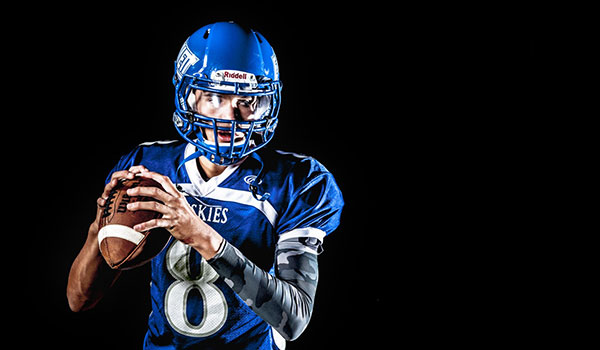 Here?s a question for you: what do you believe to be the most important skill required for a quarterback to succeed? A good quarterback needs a strong throwing arm, quick feet, strong cognitive skills, and leadership qualities ?surely everyone could agree on that. But is that enough to truly excel at the sport?
Here?s a question for you: what do you believe to be the most important skill required for a quarterback to succeed? A good quarterback needs a strong throwing arm, quick feet, strong cognitive skills, and leadership qualities ?surely everyone could agree on that. But is that enough to truly excel at the sport?
Quarterbacks tend to intensively train their physical strength without realizing that enhancing their visual and cognitive skills could render their exercise drills more effective. Acute peripheral vision and exceptional reaction time, among other visual skills, are critical to quarterback?s success. Sports vision training lays the cornerstone for these skills and helps players be the athletes they know can be. Contact Dr. Cameron McCrodan or Dr. Scott Irvine to see how sports vision training can help your child or players improve their game.
Quarterbacks Need Above-Average Vision Skills to Succeed
It goes without saying that a good quarterback needs to have a strong throwing arm. But a strong arm alone does not guarantee success. The quarterback needs to evaluate distance and other players? speeds accurately, which is where visual skills come in.
Quarterbacks need to be aware of everyone and everything around them and understand the precise location and path of movement of every player. At the same time, they need to follow the ball.
Which Visual Skills Can Sports Vision Training Improve?
In a pass play, the quarterback gets the ball and draws back. Being at the back of the action, he has only a split second to choose among up to five receivers he could throw the ball to. Why only a split second? Because there are anywhere from 3 – 11 rivaling defense players trying to run the quarterback into the ground or get him to make the wrong decision.
Given this scenario, which visual skills are needed for a quarterback to succeed?
Eye Focusing Skills
Following a quick-moving object ? i.e. the wide receiver ?requires sustained focusing power control and an ability for the eyes to shift quickly and accurately.
Depth Perception
By increasing and stabilizing binocular depth perception, quarterbacks can improve their spatial judgment. If the receiver is farther than you assessed, your pass will not reach him. Is he closer than you thought? He may have to stretch, jump, or run for it.
Peripheral Vision
When the quarterback has the ball, all the opponent?s players’ eyes are on him. Most dangerous are those who can see the quarterback, but he can’t see them because they are at the edge of his visual field. Strong peripheral/side vision prepares quarterbacks to see where the defenders are located at any given time.
Visual Reaction Time
This refers to the speed with which the quarterbacks’ brain interprets and reacts to the opponent’s action. His next step depends on how quickly and efficiently his brain integrates the visual input with motor functions.
Gross-Visual Motor
The quarterback has processed all the information and reached a decision while he was moving. This requires excellent coordination between the eyes, hands, legs, and the rest of the body. Now it is time to act. With vision and movement perfectly aligned, the ball will reach the player the quarterback chooses at the exact point in space and time he decides.
What you just read was a second in a football game. Even though it wasn?t a particularly complicated situation, the advantages of superb visual skills are evident.
Enhancing the Performance of a Quarterback
You can train visual skills just like you would any other skill. Optometrists, such as Dr. Cameron McCrodan or Dr. Scott Irvine, offer sports vision training to help players achieve their goals and take their game to the next level. A functional eye exam will evaluate visual skills, after which Dr. Cameron McCrodan or Dr. Scott Irvine will create a personal vision training plan. The child will typically receive in-office therapy once or twice a week, coupled with home exercises.
At Opto-mization NeuroVisual Performance, we help players be the athletes they know they can be. We train players from Victoria, Nanaimo, Duncan, Vancouver Island, and throughout British Columbia.